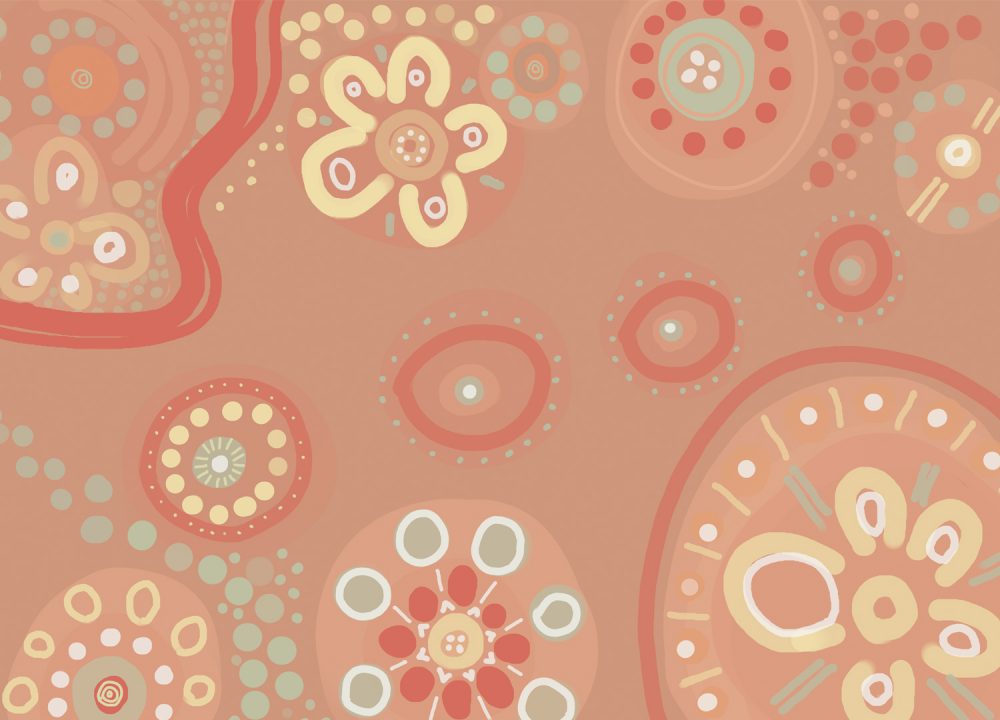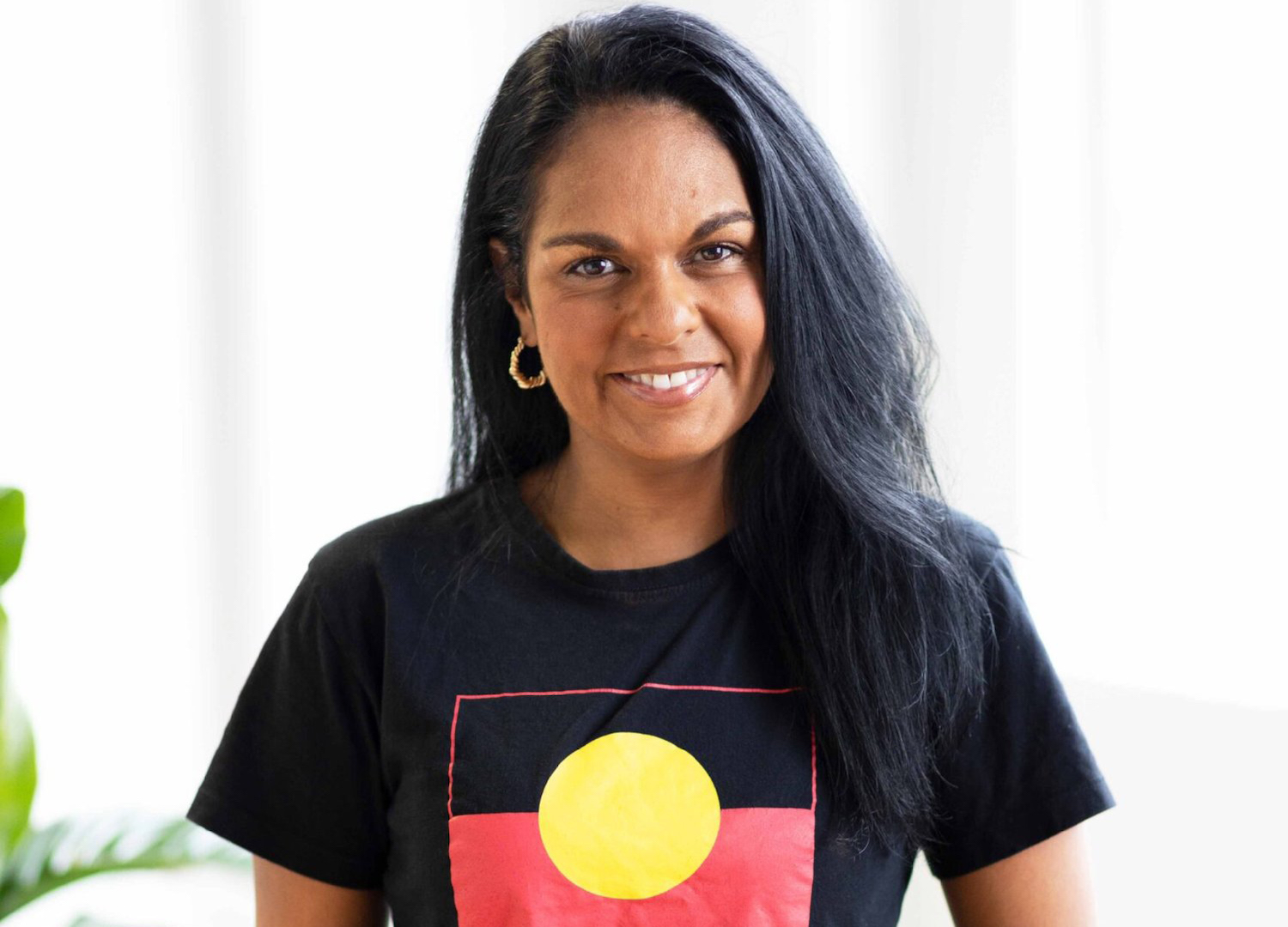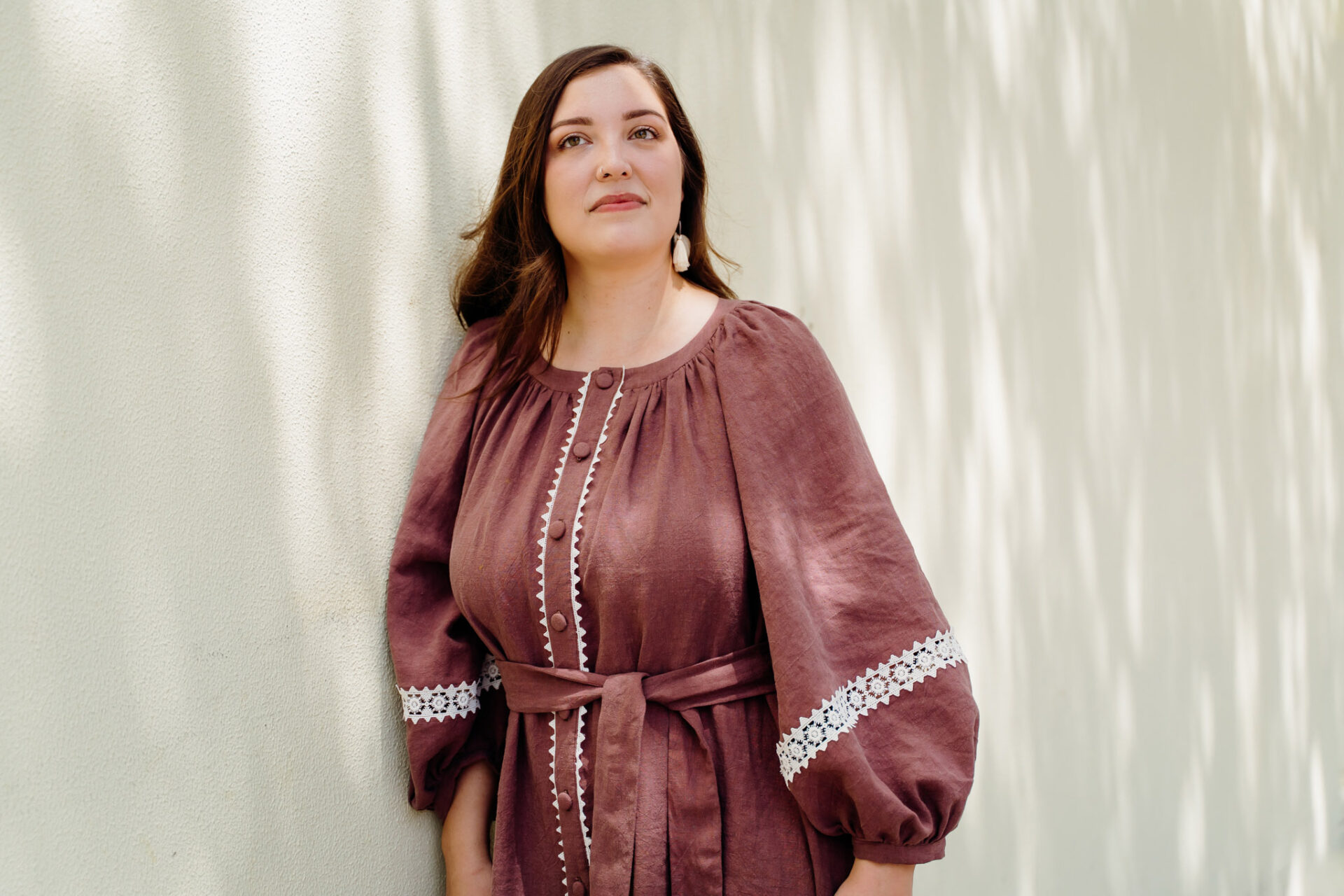Voice, A New Vision: How We Vote Will Forever Change Our Narrative

- Words by Peppermint
words TEELA REID artwork LAUREN ROGERS
The Uluru Statement from the Heart, released in 2017, is the largest consensus of First Nations peoples on a proposal for substantive recognition in Australian history. In a historic move, Anthony Albanese endorsed the statement during his 2022 election victory and this year will see a referendum called for an Indigenous Voice to Parliament. The Senate vote earlier this week signals the end of the processes and procedures needed to pass legislation to hold a referendum. Prime Minister Anthony Albanese will now set a date that is no sooner than two months and no later than six months.
While the Voice is not, nor should be, considered a cure-all for the systemic racism of this country, it is an important starting point for ongoing structural change. In Issue 57, Peppermint had the honour of working alongside Wiradjuri and Wailwan lawyer Teela Reid as she penned the feature ‘Voice, A New Vision’ – centring her fierce commitment to bettering the status quo.
As part of Peppermint’s commitment to sharing valuable resources and amplifying First Nations’ voices, we have published this feature online in full so it is free for all to access. Here, Teela speaks to “reckoning, not reconciliation” and why it’s high time we wrote a new chapter in our nation’s history.

Let me be very clear from the outset; this always was, always will be, First Nations land, sky and sea.
Yaama, I’m Teela Reid! I’m a proud Wiradjuri and Wailwan woman, lawyer, storyteller and the co-founder of Blackfulla Bookclub on Instagram – a community platform that celebrates First Nations Ancestors as the original storytellers. I was born and raised in my community, Gilgandra in western New South Wales. I am also an Aboriginal Land Rights litigator and the inaugural First Nations Lawyer in Residence at the University of Sydney Law School. Previously, I was a working group leader on Section 51(xxvi), commonly known as the Race Power, of the Australian constitution that culminated in the Uluru Statement from the Heart.
READ MORE – Voice, A New Vision: The Process and Principles of a Referendum
The idea to enshrine a First Nations Voice is one of the systemic changes mandated in the Uluru Statement from the Heart: “We call for a First Nations Voice to Parliament enshrined in the constitution.” That is the invitation the Australian people have overwhelmingly accepted at the heart of the Uluru Statement – to enshrine a “First Nations Voice”. It invites the Australian people to “walk with us” towards a First Nations Voice and a Makarrata Commission. A Makarrata Commission would supervise a process of treaties and truth-telling. Makarrata is a Yolngu word meaning “coming together after a struggle”. This is the vision for a better future and the mandate formulated by a cross-section of the First Nations community.
How we respond to the referendum will forever change the course of our nation’s narrative.
This year is going to be an epic year as Australians vote at a referendum. How we respond to the referendum will forever change the course of our nation’s narrative. It is so important Australians actively participate in this process and make an informed choice to vote yes or no. The only way to change the constitution is via the Australian people. Politicians do not have the power to change it; the constitution is the people’s document.
READ MORE – Voice, A New Vision: Actioning Solidarity Through Allyship
This is a movement of the Australian people, walking in solidarity with First Nations peoples. It is powered by everyday Australians who want to build a better future for our nation with a shared vision to ensure we achieve a First Nations Voice enshrined in the Australian constitution. A future that is built on the self-determination of the many different voices of the First Nations; having a voice on the laws and policy decisions that affect our lives within our communities.
It is powered by everyday Australians who want to build a better future for our nation… A future that is built on the self-determination of the many different voices of the First Nations; having a voice on the laws and policy decisions that affect our lives within our communities.
To appreciate the importance of this call to action, it is vital to understand that building a First Nations Voice is simply the starting point and not the end goal. A First Nations Voice enables Makarrata and sets the framework for processes of treaties and truth-telling across the continent. Both the Voice and Makarrata are not new concepts within Aboriginal activism; there are many examples in history of Aboriginal people calling for greater control and decision-making power over our lives, families and communities. A Makarrata, or resolution to peace, was also tabled to the Australian Government in 1985 in the Social Justice Package Report.
Solidarity with the mandate for a First Nations Voice does not mean you expect all First Nations to agree, but it does mean you accept the idea to enshrine a First Nations Voice to Parliament is to enable the many different voices to be heard and allow First Nations peoples to speak on behalf of the issues confronting their communities.
Our ability to influence systemic change depends on our capacity to mobilise in a unified way. It doesn’t mean we all agree, but it does demand that we stand in solidarity, despite our differences, to fight for a new vision. Tension is useful when it galvanises the strength in unity that is capable of disrupting the plans of the powerful. When it comes to activism, there is no room for small talk; we must have skin in the game both on and off the court, playing not only by Australia’s rules but by our own. It is up to you to decide what side of history you’re going to stand on, to mobilise your resources and to commit to the mandate in the Uluru Statement from the Heart. Empowering yourself with accurate information about what the First Nations Voice is and why it is necessary to go to a referendum is vital to ensuring you safely engage in the public conversation.
Our ability to influence systemic change depends on our capacity to mobilise in a unified way. It doesn’t mean we all agree, but it does demand that we stand in solidarity, despite our differences, to fight for a new vision.
As a nation, the story we tell ourselves about who we are, our national identity and our connection to one another is inevitably tied to how Australia values the sovereignty and self-determination of First Nations peoples. Together, let’s write a new chapter in our nation’s history!
READ MORE – Voice, A New Vision: A Chronology of First Nations Action
JOIN OUR MAILING LIST
Brighten up your inbox with our not-too-frequent emails featuring Peppermint-related news, events, competitions and more!
explore
More articles
Look, I don’t want to make anyone panic but IT’S DECEMBER!!! If you’re planning to give homemade gifts, you’re going to have to act fast. …
Hang out with us on Instagram
🌻 The Paddington 🌻
This is a much-loved staple, created for Issue 50 in 2021. We love seeing the #PeppermintPaddingtonTop continually popping up in our feeds!
How stunning is our model Elon MelaninGoddessEfon – she told us it was one of the first times she had been asked to come to a shoot with her natural hair. 🌻
We worked with South African patternmaker Sarah Steenkamp of @FrenchNavyNow_ to create this wardrobe essential – the perfect puff-sleeve blouse. Raglan sleeves make it the ultimate beginner sew, plus the gorgeous back buttons let you add your own personal twist.
Pattern via the link in bio! 🪡
Photos: @KelleySheenan
Fabric: @Spoonflower
Model: MelaninGoddessEfon

“In the 1940’s, Norwegians made and wore red pointed hats with a tassel as a form of visual protest against Nazi occupation of their country. Within two years, the Nazis made these protest hats illegal and punishable by law to wear, make, or distribute. As purveyors of traditional craft, we felt it appropriate to revisit this design.”
Crafters have often been at the heart of many protest movements, often serving as a powerful means of political expression. @NeedleAndSkein, a yarn store in Minnesota, are helping to mobilise the craftivists of the world with a ‘Melt The Ice’ knitting pattern created by @Yarn_Cult (with a crochet pattern too), as a way of peaceful protest.
The proceeds from the $5 pattern will go to local immigrant aid organisations – or you can donate without buying the pattern.
Raise those needles, folks – art and craft can change the world. 🧶
Link in bio for the pattern.
Images: @Gather_Fiber @NeedleAndSkein @a2ina2 @KyraGiggles Sandi.204 @WhatTracyMakes AllieKnitsAway Auntabwi2
#MeltTheIce #Craftivism #Knitting #CraftForChange

TWO WEEKS TO GO! 🤩
"The most important shift is moving from volume-led buying to value-led curation – choosing fewer, better products with strong ethics, considered production and meaningful stories. Retailers have real influence here: what you buy signals what you stand for. At Life Instyle, this means using the event to discover and invest in small-scale, planet-considerate brands that align with your values and your customer’s conscience. Consumers don’t need more things; they need better things, and retailers play a key role in selecting, contextualising, and championing why those products matter."
Only two more weeks until @Life_Instyle – Australia`s leading boutique retail trade show. If you own a store, don`t miss this event! Connect with designers, source exquisite – and mindful – products, and see firsthand why this is Australia’s go-to trade show for creatives and retailers alike. And it`s free! ✨️
Life Instyle – Sydney/Eora Country
14-17 February 2026
ICC, Darling Harbour
Photos: @Samsette
#LifeInstyle #SustainableShopping #SustainableShop #RetailTradeEvent

Calling all sewists! 📞
Have you made the Peppermint Waratah Wrap Dress yet? Call *1800 I NEED THIS NOW to get making!
This gorgeous green number was modelled (and made) by the fabulous Lisa of @Tricky.Pockets 🙌🏼
If you need a nudge, @ePrintOnline are offering Peppermint sewists a huge 🌟 30% off ALL A0 printing 🌟 when you purchase the Special Release Waratah Wrap Dress pattern – how generous is that?!
Head to the link in bio now 📞
*Not a real number in case that wasn`t clear 😂
#PeppermintWaratahWrapDress #PeppermintPatterns #SewingPattern #WrapDress #WrapDressPattern

8 Things to Know About January 26 - from @ClothingTheGaps:
Before you celebrate, take the time to learn the truth. January 26 is not a day of unity it’s a Day of Mourning and Survival for Aboriginal and Torres Strait Islander peoples.
It marks the beginning of invasion, dispossession, and ongoing colonial violence. It’s time for truth-telling, not whitewashed history.
Stand in solidarity. Learn. Reflect. Act.
✊🏽 Blog written by Yorta Yorta woman Taneshia Atkinson.
🔗 Link in bio of @ClothingTheGaps to read the full blog
#ChangeTheDate #InvasionDay #SurvivalDay #AlwaysWasAlwaysWillBe #ClothingTheGaps

As the world careens towards AI seeping into our feeds, finds and even friend-zones, it`s becoming increasingly hard to ignore.
We just wanted to say that here at Peppermint, we are choosing to not print or publish AI-generated art, photos, words, videos or content.
Merriam-Webster’s human editors chose `slop` as the 2025 Word of the Year – they define it as “digital content of low quality that is produced usually in quantity by means of artificial intelligence.” The problem is, as AI increases in quality, it`s becoming more and more difficult to ascertain what`s real and what`s not.
Let`s be clear here, AI absolutely has its place in science, in climate modelling, in medical breakthroughs, in many places... but not in replacing the work of artists, writers and creatives.
Can we guarantee that everything we publish is AI-free? Honestly, not really. We know we are not using it to create content, but we are also relying on the artists, makers and contributors we work with, as well as our advertisers, to supply imagery, artwork or words created by humans. AI features are also creeping into programs and apps too, making it difficult to navigate. But we will do our best to avoid it and make a stand for the artists and creatives who have had their work stolen and used to train AI machines, and those who are now losing work as they are replaced by this energy-sapping, environment-destroying magic wand.
Could using it help our productivity and bottom line? Sure. And as a small business in a difficult landscape, that`s a hard one to turn down. We know other publishers who use AI to write stories, create recipes, produce photo shoots... but this one is important to us.
`Touch grass` was also a Merriam-Webster Word of the Year. We`ll happily stick with that as a theme, thanks very much. 🌿

















